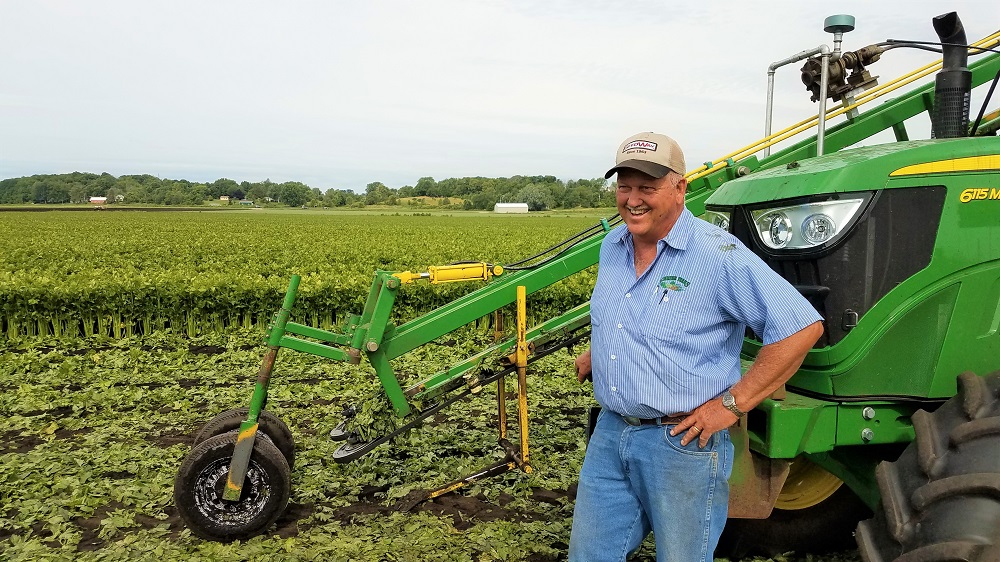In late June, the pale green stalks of celery contrast sharply with Hudsonville’s black soil.
“This is good muck, really good muck,” Gary Wruble, general manager of the Michigan Celery Promotion Cooperative (MCPC), remarks as he rolls up to one of the fields managed by Schreur Farms.
Farmer Bruce Schreur is standing beside his celery harvester, which he used that morning. You can tell by his stained hands that he’s been working in that muck for years.
Schreur represents the fourth generation in a family that has been farming in West Michigan since the late 19th century. “My great grandfather on both sides lived two miles down the swamp at the corner of Chicago Drive and 64th,” Schreur says and laughs. “My grandfather went to work for farmer Gelder and married the farmer’s daughter.”
His father was the youngest of six and didn’t inherit any of the original acreage, but he was able to purchase a few acres farther east, Schreur says — some of the very same land he farms today.

With 250 acres, Schreur Farms is the largest celery producer in Michigan and one of five that belong to the MCPC, which represents 55 percent of the state’s celery crop. (Michigan is one of the top celery-producing states in the country and, according to Wruble, has more celery acres in production than Ontario and Quebec combined.)
MCPC and its members set pricing and oversee the processing, packaging, and sale of their crop. While Michigan can’t compete with California in terms of scale, Wruble says, they have a big advantage in the eyes of regional grocery stores: freshness. It only takes a couple days to move Michigan celery from the field to a local grocery store, much less than it takes to ship it all the way across the country.
That freshness is also enjoyed by the families Feeding America West Michigan serves. Since 2004, MCPC has donated more than 160,000 pounds of celery to our organization.
Production manager Roger Lutke is quick to point out that the celery they donate is just as fresh as the celery they sell.
“We have an order for 40,000 pounds of a certain cut,” Lutke explains. “When you’re running the line like that you don’t stop the line right at 40,000. We run over. It’s the same stuff that was on the truck, but we have 700, 800 pounds [extra].” Rather than let that good produce go to waste, they send it to us.
MCPC processes celery in a variety of ways, dicing it for soups, freezing it and selling it whole. On the day of our visit, Lutke’s team is processing celery into 3-inch sticks.
The machinery removes the leaves and the “butts,” slices the stalks, washes it twice and delivers it into large, plastic-lined totes that can each hold about 1,150 pounds of celery. Each stage of the process is overseen by workers who pick out any sticks, butts or defective pieces that might have slipped through.
Lutke explains that the blower, which removes leaves and loose particulate matter, and the slicer were purchased. “The rest we pretty much built ourselves,” he says. “That’s what we do in the wintertime.”
Feeding America West Michigan is MCPC’s recipient of choice, Lutke says, because we have a local impact while being large enough to handle big donations. “I mean, when you have a hundred bushels of zucchini, your local food [pantry] can’t swallow it, but you guys can.”
Lutke’s desire to make sure his neighbors are able to enjoy local produce, even if they can’t afford to buy it in the store, is clearly personal. But he says many growers in the community feel just as strongly.
“I think just the actual thought of people, especially children, going to bed at night without food is something that is heavy on their mind. And they just feel like it shouldn’t happen and they do whatever they can to make sure it doesn’t.”
We’re grateful for MCPC, Schreur Farms and all our partners in local agriculture for helping us ensure that all our neighbors have access to healthy food.

